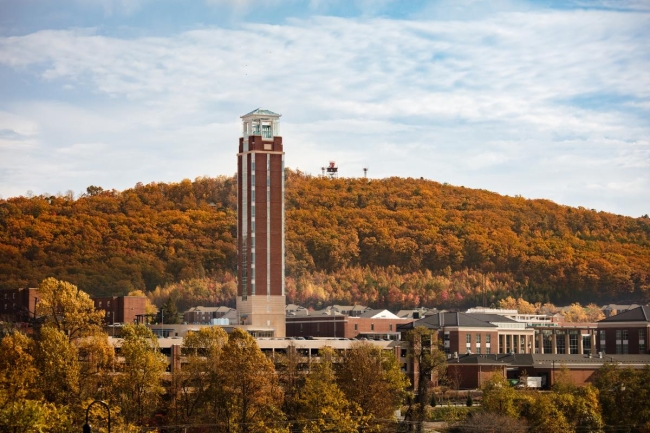You have /5 articles left.
Sign up for a free account or log in.

The Freedom Tower on Liberty University's campus
Liberty University
Liberty University has upset some students, parents and faculty with a decision to let students return to campus after spring break, despite concerns about the spread of the novel coronavirus.
But it's unlikely the private evangelical university in Lynchburg, Va., will face legal liability for this move. Instead, like many other decisions made by Liberty's president, Jerry Falwell Jr., an early and avid supporter of Donald Trump's presidential run, Liberty's actions are playing out in the press and the court of public opinion.
After Ralph Northam, Virginia's governor, announced on March 15 a ban on gatherings of 100 people or more, many colleges in the state closed their campuses and transitioned students to remote learning. Liberty instead welcomed students back after spring break but held most classes online to comply with the governor's ban.
The decision stood out in part because Liberty has touted the fact that it is one of the largest online universities in the country, and its online program has significantly bolstered its finances. Northam has criticized the move, saying that Liberty is sending mixed messages about the virus and asking Falwell to reconsider his decisions, according to the Shore Daily News.
Treney Tweedy, mayor of Lynchburg, also called Falwell "reckless," according to The New York Times.
Now, Virginia has issued a stay-at-home order until June. Some Liberty students are showing signs of COVID-19 infections, and at least one has tested positive. Hundreds of students who came back to campus have returned home.
Falwell has pushed back on media reports of the decision and its consequences, accusing the Times of lying.
While the decision to bring back students to Lynchburg has been widely criticized, some experts think it's unlikely Liberty could be held liable for the move because students aren't being forced to return to campus.
"Many people are living in apartment houses and other residences that are as densely populated as any college residence hall, and if the university has good health services and provides the students with resources and support should they become ill, then it might be hard to prove that the institution was negligent," said John Lombardi, a former president and chancellor at several universities.
He doubts that any state governor would want to make all students leave their campuses, since many continue to care for students who can't afford travel home.
"Many university students of residential campuses currently live in nearby off-campus housing with multiple occupants, or apartments with mostly student occupants," he said. "These students have not been ordered to return to a home residence in some other city, and so they remain in place, continuing with their courses online."
It's difficult to determine whether Liberty's decision violates the governor's order, Lombardi said, adding that any legal issues that may arise from the situation would be for the courts to decide.
Liberty officials declined an interview with Inside Higher Ed, instead sending a list of answers to common questions the college is facing.
To comply with Northam's most recent stay-at-home order, the university is closing down remaining in-person instruction at the School of Aviation, according to the statement. Students who wish to return to their dorm rooms for the first time will have to self-quarantine for two weeks at a housing annex. Faculty members can teach courses and hold office hours from home.
Liberty will continue to use the same procedures it put in place to be compliant with the ban on gatherings, including providing food for carryout only and limiting the number of students who enter certain spaces. The state's Department of Health did a surprise inspection of the campus last week and found it was compliant with the governor's previous order, banning large gatherings. That was before Northam issued the stay-at-home order for the state Monday.
The university's decision to let students return to campus will not be reconsidered, despite the governor's new order, according to the statement Liberty provided.




